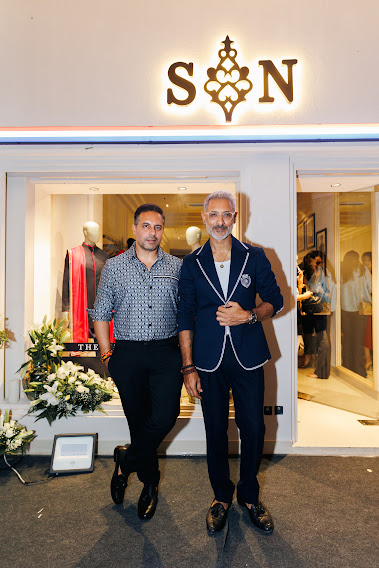Chandigarh: Stressing that fashion designers tend to ignore the opportunities that tier-II cities like Chandigarh offer, designers Shantnu & Nikhil, who have been getting plenty of orders from customers in Chandigarh, Amritsar and Jalandhar recently opened their store in Chandigarh.
They tell IANS that many clients from here have griped about having to make the trek to Delhi for their personalised wedding shopping, and thus they wanted to bring the high-street shopping experience to this fashion-forward city.
“We thought that this would be a key region to have the presence of an S&N by Shantnu Nikhil store. Besides other stuff, the store here will boast ready-to-wear styles amalgamated in a harmonious fusion of contemporary elegance and style. Crafted for the #Glamsquad, this festive drop encapsulates the essence of celebration wear like never before,” they say.
The label, founded by the brothers in the year 2000 is known for its classic menswear silhouettes, be it a bandhgala or a S&N classic crest shirt. Precisely why, almost 70 per cent of their collection in the new store are for men.
“So, it is just the way the brand has been in terms of its ratio. It is just a reflection of what they truly represent in their stores.”
Stressing that the fashion industry is a dynamic space, and trends and consumer preferences dictate their collection and design aesthetics, Shantnu feels the definition of fashion for men has changed majorly over the past decade as there is a greater focus on cuts, drapes and sheer shirts, rather than the classic bandhgalas and sherwanis.
“They are also open to experimenting with our couture shoes and accessories, they are not shying away from maximalist embroidered tuxedos. A good fit is what makes your look stand out from the crowd. However, we aim to combine Indian heritage with high-street spunk. We encourage men to take the anti-trend route when it comes to their clothing choices, by reflecting the sartorial narrative of its rich history and adopting the contemporary route. It is wonderful to see them owning up to their personal style and, it is actually great when it comes to a country like India,” adds Nikhil.
Even as several major foreign brands and designers tend to ignore the extreme weather conditions in India, the duo are in the process of crafting fabrics that are specific to the weather here.
“We believe in providing comfort and quality with our ensembles. Along with my team, I travelled 5,000 km in 11 days to factories in Shanghai, Xibu and Guangzhou. These factories have patents for their own fabric and are willing to work with designers to create specific counts and constructions for India. We are trying to build a kind of technology in which we can infuse fabrics that are suitable for India, such as cotton that resembles mulmul to create some stunning drapes without compromising on comfort,” says Shantnu.
Ask them how they deal with creative differences, and Shantnu asserts that they are completely in sync at work. Adding that his job is to give Nikhil the intelligence he needs to create, Shantnu says, “Commerce always follows art, so it is important that he has a free rein. Sometimes, of course, his ideas go wild but I have learnt to overlook…, as brothers do. Every now and then, my team sits with the design team and he sits with my team to understand what analytics mean, what merchandise mapping stands for.”
He, however, adds that on the tennis court they are gladiators.
Nikhil feels it is important that fashion students get out of their textbooks and do rigorous internships. Although they feel that in the past decade, especially post-pandemic, things have started rolling in towards online exposure, they say, “We do feel that it is very necessary for students to have industry exposure and knowledge where they know the inner workings of any fashion house.”
The designers, who recently inaugurated a store in Hyderabad for their bridge-to-luxury brand feel that post the multiple waves of the pandemic, the world has adapted towards more emotive purchasing and people are buying things that have the power of classic and timelessness towards it.
“They are not really giving into trends, but purchasing items that are a reflection of their personal style and something which will be relevant even after 10 years. The whole concept of purchasing trending items is not relevant to purchasing patterns to a large extent, but instead purchasing patterns rely more on how people adapt a certain product into their lifestyles,” conclude the designers, who are gearing towards expansion.
(Sukant Deepak can be reached at sukant.d@ians.in)
–IANS


Comments are closed.